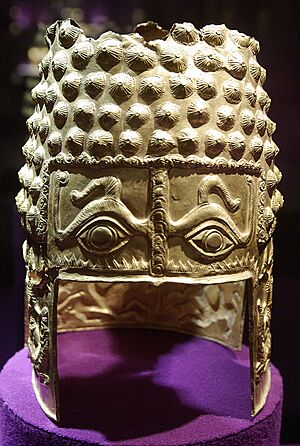Helmet of Coțofenești facts for kids
Quick facts for kids Helmet of Coțofenești |
|
|---|---|
 |
|
| Material | Electrum (gold-silver-copper alloy) |
| Created | between 450–400 BC |
| Discovered | Late 1920s Coțofenești, Vărbilău, Prahova County, Romania |
| Present location | Unknown (after 2025 theft) |
The Golden Helmet of Coțofenești is a very old and special helmet. It was made by the Geto-Dacians, who were ancient people living in the area of modern-day Romania. This helmet is made of electrum, a natural mix of gold and silver. It was created a long, long time ago, around 450-400 BC. The helmet was found in a village called Coțofenești in Romania. For many years, it was kept safe at the National History Museum of Romania in Bucharest.
In 2025, the helmet was on display at the Drents Museum in the Netherlands as part of a special traveling exhibit. Sadly, it was stolen during a robbery. No one knows where the helmet is now or what condition it is in.
Contents
How the Helmet Was Found
An Amazing Discovery
The Golden Helmet was found in 1926. A young farmer's child named Traian Simion was looking after sheep in a village called Poiana Coțofenești, which is now part of Vărbilău in Prahova County, Romania. The child found the helmet in a grassy area.
A Toy and a Watering Trough
For about two weeks, the child played with the helmet like a toy. Because of this, some parts of the helmet broke off. Experts who studied the helmet later believe the top part was damaged from being hit or pulled while it was hanging on a tree. The helmet was even used as a watering trough for chickens! Eventually, the farmer put the helmet on top of his chicken coop.
The Helmet Is Saved
Later, a merchant from Ploiești named Ion Marinescu-Moreanu bought the helmet. He paid 30,000 lei for it, which was a lot of money back then. It was like 30 years of income for the farmer. Marinescu then offered the helmet to the head of the Ministry of Arts. In April 1929, the Ministry of Public Instruction and Cults bought the helmet for the National Museum of Antiquities. This museum is now known as the National History Museum of Romania. Since the 1970s, the helmet has been kept at this museum.
What Archaeologists Found
After the helmet was discovered, an archaeologist named Ioan Andrieșescu studied the area where it was found. His team looked carefully at the site. They realized the helmet was not part of a hidden gold treasure or a burial site. Instead, it was found near an ancient Geto-Dacian settlement from the La Tène culture period. This means the helmet was likely just lost or left behind, rather than being buried on purpose. Only a few pieces of old pottery were found nearby.
The Helmet Is Stolen
On January 25, 2025, officials in the Netherlands announced that the Golden Helmet had been stolen. It was taken from the Drents Museum in Assen, where it was on loan. Three golden Dacian bracelets were also stolen at the same time. Experts believe the thieves might have planned to melt down these ancient items.
The theft caused a lot of discussion in Romania about how valuable artifacts are loaned to other countries. On January 28, 2025, the Romanian Minister of Culture, Natalia Intotero, removed the museum's director from his position. She stated that he had "failed to adequately protect the national heritage."
See also
 In Spanish: Casco de Coțofenești para niños
In Spanish: Casco de Coțofenești para niños

